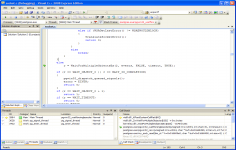 PostgreSQL 8.4.4
PostgreSQL 8.4.4
PostgreSQL Global Development Group - (Freeware)
PostgreSQL is a good choice when it comes to object-relational database management system, being one of the strongest competitors for Microsoft SQL Server, Firebird, Oracle, Sybase.
PostgreSQL for Windows is a software for managing relational database and Ordbms objects that will run on your operating system. It is recognized worldwide for its stability and its programming possibilities particularly extensive in the engine of your database using the PL / pgSQL.
PostgreSQL is the main competitor for MySQL, Firebird, Oracle, Sybase or Microsoft SQL Server and it is fully ACID compliant and has support for foreign keys, joins, views, triggers, and stored procedures. It also includes the windowing functions, common table expressions and recursive joins a parallel restore, consolidated hash indexes, support for SSL certificates for user authentication, routines statistics function, etc.It allows to manage tables, libraries for many languages to access records from programs written in Java (JDBC), C + + / C, Perl or Tcl / Tk.ODBC API allows any application that supports this type of interface to access PostgreSQL databases.
PostgreSQL is highly customizable running stored procedures in more than a dozen programming languages, including Java, Perl, Python, Ruby, Tcl, C/C++,and its own PL/pgSQL, which is similar to Oracle's PL/SQL.
- Title:
- PostgreSQL 8.4.4
- File Size:
- 41.2 MB
- Requirements:
- Windows (All Versions)
- Language:
- en-us
- License:
- Freeware
- Date Added:
- 07 Jun 2010
- Publisher:
- PostgreSQL Global Development Group
- Homepage:
- http://www.postgresql.org
- MD5 Checksum:
- A808D363D3A2A4BCA2F0F74D4F0D615F
* Enforce restrictions in plperl using an opmask applied to the whole interpreter, instead of using Safe.pm (Tim Bunce, Andrew Dunstan)
- Recent developments have convinced us that Safe.pm is too insecure to rely on for making plperl trustable. This change removes use of Safe.pm altogether, in favor of using a separate interpreter with an opcode mask that is always applied. Pleasant side effects of the change include that it is now possible to use Perl's strict pragma in a natural way in plperl, and that Perl's $a and $b variables work as expected in sort routines, and that function compilation is significantly faster. (CVE-2010-1169)
* Prevent PL/Tcl from executing untrustworthy code from pltcl_modules (Tom)
- PL/Tcl's feature for autoloading Tcl code from a database table could be exploited for trojan-horse attacks, because there was no restriction on who could create or insert into that table. This change disables the feature unless pltcl_modules is owned by a superuser. (However, the permissions on the table are not checked, so installations that really need a less-than-secure modules table can still grant suitable privileges to trusted non-superusers.) Also, prevent loading code into the unrestricted "normal" Tcl interpreter unless we are really going to execute a pltclu function. (CVE-2010-1170)
* Fix data corruption during WAL replay of ALTER ... SET TABLESPACE (Tom)
- When archive_mode is on, ALTER ... SET TABLESPACE generates a WAL record whose replay logic was incorrect. It could write the data to the wrong place, leading to possibly-unrecoverable data corruption. Data corruption would be observed on standby slaves, and could occur on the master as well if a database crash and recovery occurred after committing the ALTER and before the next checkpoint.
* Fix possible crash if a cache reset message is received during rebuild of a relcache entry (Heikki)
- This error was introduced in 8.4.3 while fixing a related failure.
* Apply per-function GUC settings while running the language validator for the function (Itagaki Takahiro)
- This avoids failures if the function's code is invalid without the setting; an example is that SQL functions may not parse if the search_path is not correct.
* Do constraint exclusion for inherited UPDATE and DELETE target tables when constraint_exclusion = partition (Tom)
- Due to an oversight, this setting previously only caused constraint exclusion to be checked in SELECT commands.
* Do not allow an unprivileged user to reset superuser-only parameter settings (Alvaro)
- Previously, if an unprivileged user ran ALTER USER ... RESET ALL for himself, or ALTER DATABASE ... RESET ALL for a database he owns, this would remove all special parameter settings for the user or database, even ones that are only supposed to be changeable by a superuser. Now, the ALTER will only remove the parameters that the user has permission to change.
* Avoid possible crash during backend shutdown if shutdown occurs when a CONTEXT addition would be made to log entries (Tom)
- In some cases the context-printing function would fail because the current transaction had already been rolled back when it came time to print a log message.
* Fix erroneous handling of %r parameter in recovery_end_command (Heikki)
- The value always came out zero.
* Ensure the archiver process responds to changes in archive_command as soon as possible (Tom)
* Fix pl/pgsql's CASE statement to not fail when the case expression is a query that returns no rows (Tom)
* Update pl/perl's ppport.h for modern Perl versions (Andrew)
* Fix assorted memory leaks in pl/python (Andreas Freund, Tom)
* Handle empty-string connect parameters properly in ecpg (Michael)
* Prevent infinite recursion in psql when expanding a variable that refers to itself (Tom)
* Fix psql's copy to not add spaces around a dot within copy (select ...) (Tom)
- Addition of spaces around the decimal point in a numeric literal would result in a syntax error.
* Avoid formatting failure in psql when running in a locale context that doesn't match the client_encoding (Tom)
* Fix unnecessary "GIN indexes do not support whole-index scans" errors for unsatisfiable queries using contrib/intarray operators (Tom)
* Ensure that contrib/pgstattuple functions respond to cancel interrupts promptly (Tatsuhito Kasahara)
* Make server startup deal properly with the case that shmget() returns EINVAL for an existing shared memory segment (Tom)
- This behavior has been observed on BSD-derived kernels including OS X. It resulted in an entirely-misleading startup failure complaining that the shared memory request size was too large.
* Avoid possible crashes in syslogger process on Windows (Heikki)
* Deal more robustly with incomplete time zone information in the Windows registry (Magnus)
* Update the set of known Windows time zone names (Magnus)
* Update time zone data files to tzdata release 2010j for DST law changes in Argentina, Australian Antarctic, Bangladesh, Mexico, Morocco, Pakistan, Palestine, Russia, Syria, Tunisia; also historical corrections for Taiwan.
- Also, add PKST (Pakistan Summer Time) to the default set of timezone abbreviations.
Related software
4.4/5 from 52 users

